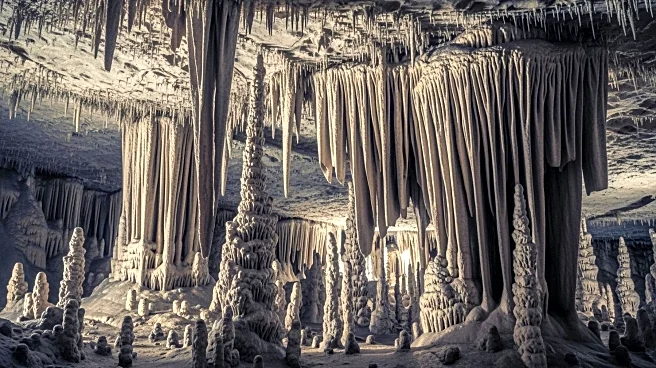What's Happening?
In northern Greenland, researchers have made a significant discovery that sheds light on the Arctic's climatic past. A team led by geologists from the University of Innsbruck has found rare geological deposits in Greenland's high Arctic caves, revealing
evidence of a much warmer climate in the region's distant past. These findings, published in Nature Geoscience, suggest that during the Late Miocene period, approximately 11 million years ago, northern Greenland experienced temperatures about 14°C warmer than today. The research highlights the sensitivity of the Arctic climate to changes in atmospheric carbon dioxide (CO₂) levels, even at moderate increases. The study's results indicate that the Arctic's climate has historically been highly responsive to CO₂ fluctuations, which could have significant implications for current and future climate conditions.
Why It's Important?
The discovery in Greenland's caves is crucial as it provides insights into how the Arctic climate has responded to past CO₂ levels, offering a potential preview of future climate scenarios. The Arctic is known for its sensitivity to temperature and atmospheric changes, and the study underscores the potential for rapid environmental shifts in response to rising greenhouse gas emissions. This research is particularly relevant as current CO₂ levels exceed those of the Late Miocene, suggesting that the Arctic could experience similar or even more dramatic changes. The findings emphasize the importance of understanding the Arctic's climate dynamics to predict and mitigate the impacts of global warming, particularly the release of greenhouse gases from thawing permafrost, which could exacerbate climate change.
What's Next?
The study serves as a warning about the potential consequences of continued CO₂ emissions and the need for urgent action to address climate change. Policymakers and environmental organizations may use this research to advocate for stronger measures to reduce greenhouse gas emissions and protect the Arctic environment. Further research could focus on monitoring current changes in the Arctic and developing strategies to mitigate the impacts of climate change. The findings may also prompt discussions on international cooperation to address the global challenge of climate change and its effects on sensitive regions like the Arctic.
Beyond the Headlines
The implications of this study extend beyond immediate climate concerns, touching on ethical and policy dimensions. The research highlights the responsibility of current generations to address climate change to prevent irreversible damage to the planet's ecosystems. It also raises questions about the role of scientific research in informing public policy and the importance of integrating scientific findings into decision-making processes. The study's insights into past climate conditions could also influence cultural perceptions of the Arctic, shifting the narrative from a static, frozen landscape to a dynamic and historically variable environment.















